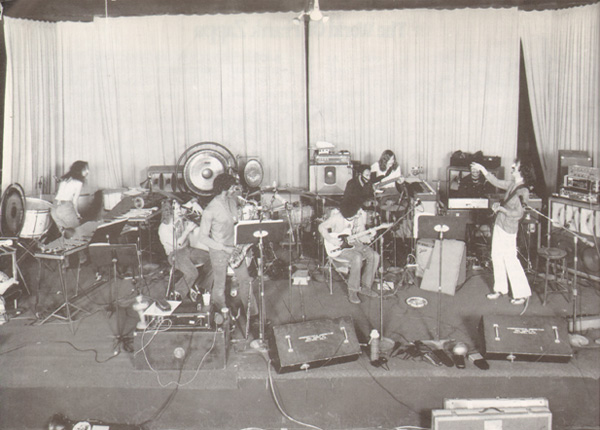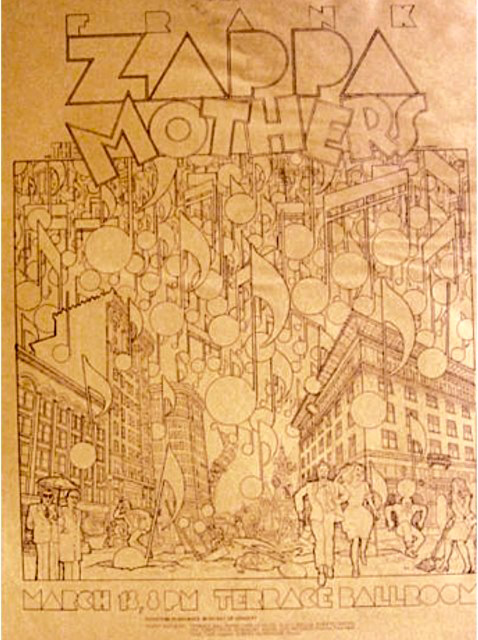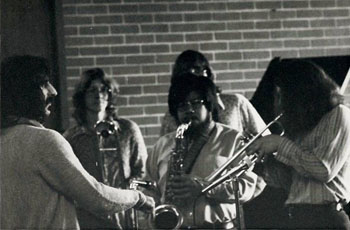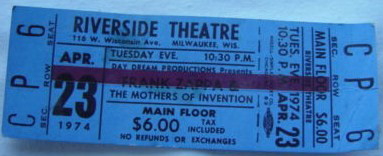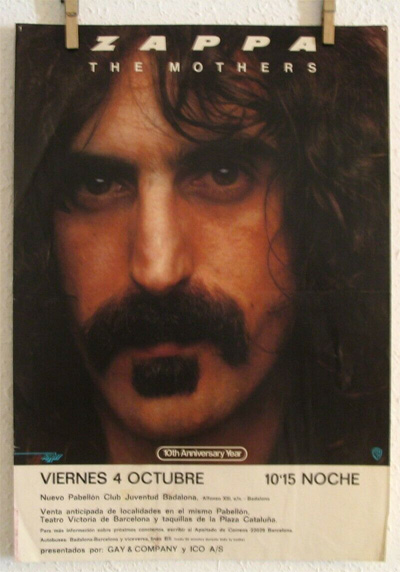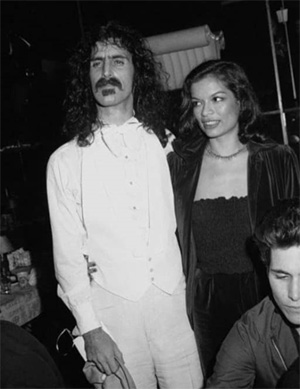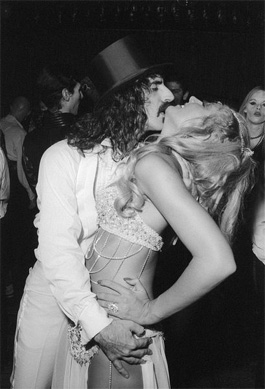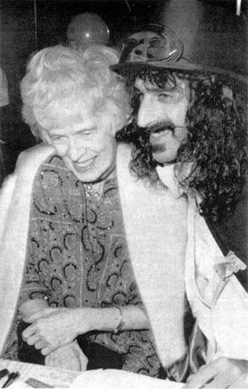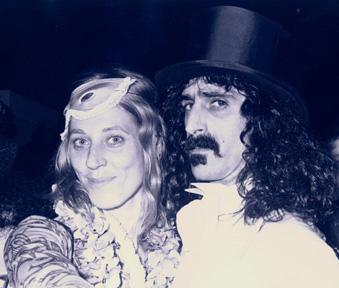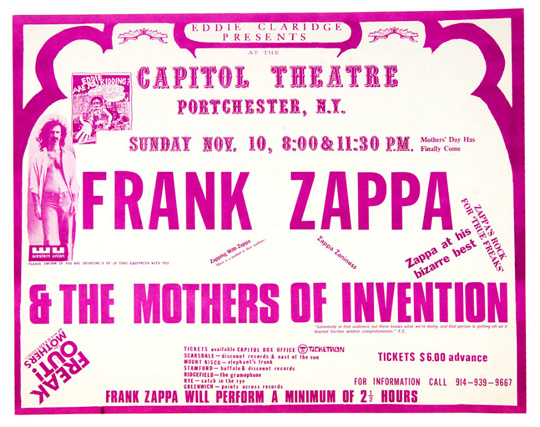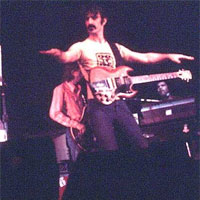The 1974 Band
Apostrophe (') 50th Anniversary Edition (2024) booklet
[photography: prob. Sam Emerson]
[photography: prob. Sam Emerson]
The Dig, August/September 1995, p. 22
[Ruth Underwood, Bruce Fowler, Napoleon Murphy Brock, Ralph Humphrey, Jeff Simmons, Chester Thompson, Tom Fowler, George Duke, FZ]SAM EMERSON—SYGMA/IMPERIAL PRESS
George Duke & Synthesizers
George Duke, "Discography—1970s," George Duke Online
I had been forced to sing with Frank Zappa [...]. I began experimenting with odd time signatures and various synthesizer textures. [Faces In Reflection (1974)] was my first solo record using a synthesizer. Frank Zappa is responsible for my introduction to synthesizers. He told me one day, that I should play synthesizers. It was as simple as that! He bought an ARP 2600 and put it next to my Rhodes. It had all these knobs and looked totally intimidating. I took it home a few times with the manual, but got nowhere. I thought I was back in College studying some abstract foreign language. I finally settled on something simpler. It was an ARP Odyssey. I decided to use an ARP, purely to be different from Jan Hammer, who was playing the Mini Moog, and had a head start on me in the mastery of synthesis. Also, Ian Underwood was real good on the 2600, and I knew I'd sound like a total novice compared to him. But I must admit, I was really drawn to the possibilities inherent therein. There were some things that were a drag also! Remember, at this time there were no presets or ways of saving patches. Not only that, but you were limited to one note at a time. So overdubbing, a good memory and management system became very important. The year was 1974.
Jeff Simmons
Chester Thompson, interviewed by Andy Greene, Rolling Stone, February 4, 2021
One tour, [FZ] bumped it up by bringing in this guy, Jeff Simmons. He was a guitarist that was comic relief, almost. He made Frank laugh and a big part of those days was humor.
Fowler Bros.
FZ, interviewed by Steve Chapman, The Event, December 1981
I never got a chance to play with all of them. The most I ever had in a band was three, but that's a pretty good average. That's definitely a unique family. The father is very interesting also. In fact at one time he invited my whole band up to the small jazz school there in Utah where he teaches, the name of which I can't think of right now, and he had us spend the day and everybody lectured on his particular instrument or skill. But the brothers are great, they're amazing musicians. I think they have their own band now.
Staff
Tom Davis, "Look Out Pretty Mama I'm On The Road Again," Bugle American, Vol. 5, No 16, May 1974
Paul Hoff, who's been travelling four years with Zappa, is the unofficial head of the Mother roadies. He was selling clothes, into a heavy drug thing, and knew nothing about the technical aspects of rock and roll before starting work with Zappa. Hoff said he "was living with a woman that was Frank's secretary, went down where they were doing a gig, asked if I could have a job, and was hired."
Coy Featherston says he too was "in the right place at the right time." Coy's older brother was a Zappa roadie until the show hit Austin, Texas three months ago [March 4, 1974]. Coy's brother decided to quit the tour and stay in town. Coy was working at Armadillo World Headquarters, the hip music mecca in Austin, when he found out that Zappa needed two equipment men. Coy talked "to Marty Perellis (Zappa's road manager) on a Sunday and started working on a Monday."
Another Austin product, a 23 year-old named Jim, was hired at the same time with a recommendation from Coy [Featherson]'s brother. "I've got a little 4-track dubbing studio in my home in Austin, and I've been starving to death there," Jim said between hits on a can of Budweiser. "I'd been doing sound in clubs around town for people like B.W. Stevenson and Tracy Nelson. When this gig came along I latched onto it because of the travel, the money, and the music."
Jim's work includes setting up the mikes, PA, and working the mixing board during the show. Coy runs mike cable, sets up George Duke's keyboard equipment, Chester Thompson's and Ralph Humphrey's drums, and jumps around the stage shooting pictures of the band during performances.
Hoff remains backstage during the shows to keep an eye on the equipment. During setup, Paul said he's responsible for seeing that "all the equipment on stage, lights, sound, band, equipment, is hooked-up and running right." It takes the roadies about three hours to unload and set up the 11 tons of equipment for Zappa and the nine Mothers.
[...]
The new truck driver for Intercontinental Absurdities, Ltd., Bill Romero, told me at his old job he "was making twice what I make now, but I was working ten times harder too. But now it's just great working for Frank. It's a beautiful atmosphere to work in because everything's so cool."
[...] Bill Romero trucks an inconspicuous National Car Rental vehicle around the country carrying Zappa-Mother paraphernalia. After the roadies have loaded the equipment in the truck at the end of a concert, Romero drives between 300 and 400 miles to the next gig. He watches the show sometimes, but usually ends up crashing in his motel room.
Romero has had some hassles with older truckers about his long hair at truck stops. "The Midwest has been probably the worst area I've encountered as far as the hair goes. In the South they look at you weird, but that's the South for you," Romero philosophized. "They look at everybody weird in the South."
[...]
Zappa's alter ego on tour is road manager Marty Perellis, a slick who said he "was throwing college dances called 'gee, I'm glad it's Friday' parties and found I enjoyed that more than the family business." Perellis figures he'd be back in Baltimore pushing pantyhose if he hadn't caught on to the entrepreneurial game.
As he slouched in a stuffed chair and severed sections from an orange, Perellis said his responsibilities include, "getting the group to and from a gig, making sure they get paid, arranging hotel accommodations, doing the books, making wake-up calls, and hiring new personnel."


